


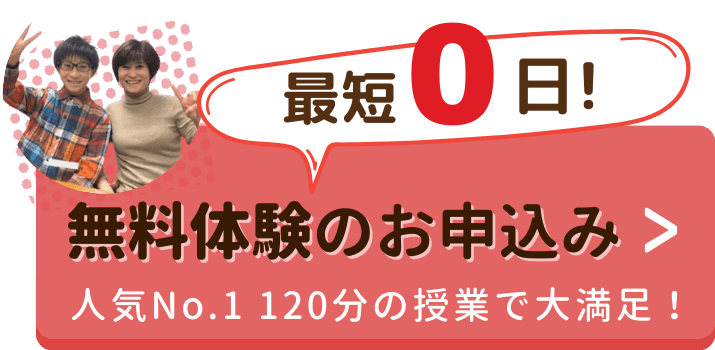
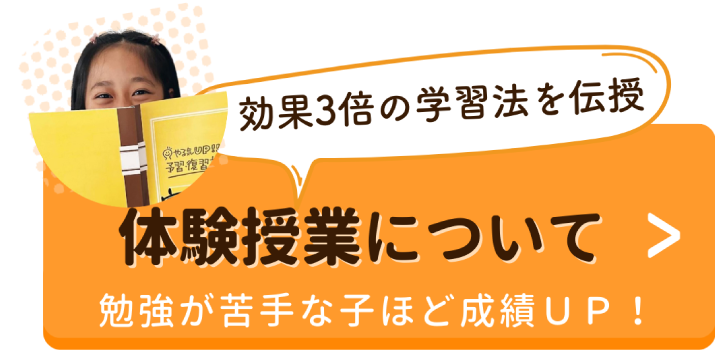
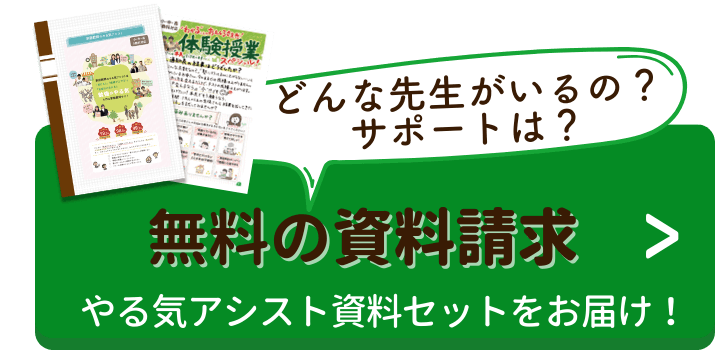

群馬県の2023年3月実施の令和5年度(2023年度)入学者の公立高校入試問題の解説をしています。
受験勉強において、過去問を解くことはとても効果的な勉強法です。ぜひ、受験までに一度挑戦し、問題の傾向を掴んでおきましょう。合わせて、
対策などをたてられるととても良いですね。
また、過去問で苦手な点が見つかった場合は、そこを中心に試験日当日までにしっかりと対策しておきましょう。
これから、No.1 と No.2 について、それぞれ 2 人の対話と、対話に関する質問が流れます。質問に対する答えとして最も適切なものを、それぞれの選択肢 A ~ D の中から選びなさい。
No. 1
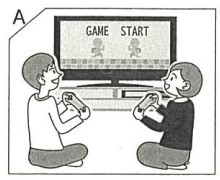
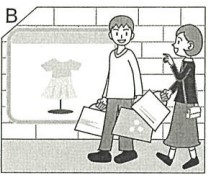
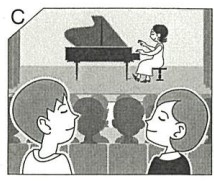
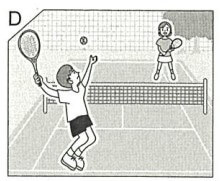
No. 2
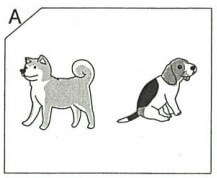
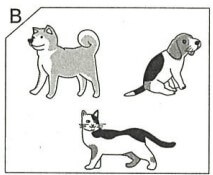
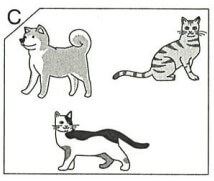
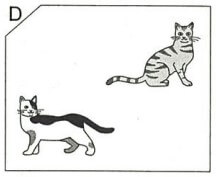
No.1 D
<全訳>A:サキ、先週の日曜日は何をしたの?/B:買い物の後、ピアノのコンサートに行ったわ。あなたはどうしてたの、トム?/A:僕は妹〔姉]とテニスをしたよ。/B:いいわね。
Q:「トムは先週の日曜日に何をしたか」一 D
No.2 C
No.2<全訳>A:やあ、ナンシー。わあ、犬を 2 匹飼ってるんだね。かわいいなあ。この公園にはよく来るの?/B:こんにちは、ケンタ。ええ。この子たちはここを散歩するのが好きなの。あなたも何かペットを飼ってる?/A:うん。犬を 1 匹と猫を 2 匹飼ってるよ。/B:まあ、そうなの?その子たちに会いたいわ。
Q:「ケンタが飼っているのはどのペットか」=C
これから、No.1 ~ No.3 について、それぞれ Jack と Miki の 2 人の対話が流れます。Miki が 2 度目に発言する部分で次のチャイムを鳴らします。(チャイム音) チャイムの部分の発言として最も適切なものを、それぞれア~エの中から選びなさい。
No.1
Jack: ・・・・・・
Miki:・・・・・・
Jack: ・・・・・・
Miki: [ ]
ア At three o’clock.
イ For two hours.
ウ Near the station.
エ Ten dollars.
No.2
Jack: ・・・・・・
Miki:・・・・・・
Jack: ・・・・・・
Miki: [ ]
ア Yes, I am.
イ No, thank you.
ウ I like reading books.
エ It’s a book about the history of China.
No.3
Jack: ・・・・・・
Miki:・・・・・・
Jack: ・・・・・・
Miki: [ ]
ア Yes. It will be the third time.
イ Yes. I have been there four times.
ウ No. I have never been there.
エ No. It will be the second time.
No.1 ア No.2 エ No.3 エ
No.1<全訳>ジャック(J):今日の午後は何をする予定なの?/ミキ(M):映画を観に行くつもりよ。一緒に行きましょう!/J:それはいいね。その映画は何時に始まるの?/M:3 時よ。
No.2<全訳>J:暇な時間はどうやって過ごしてるの?/M:そうねえ、本を読んでるわ。今、おもしろい本を読んでるところなの!/J:へえ、そうなの?いそれについてもっと教えてくれるかい?/M:中国の歴史についての本よ。
No.3<全訳>J:うれしそうだね、ミキ。/M:夏休み中にニューヨークに行くことになったのよ。
J:それはいいね。ニューヨークへの旅はこれが初めてかい?/M:いいえ。2 回目よ。
これから、国際交流のイベントで、留学生の Sara が行ったスピーチが流れます。次の[スライド]は、その時に Sara が使ったものです。スピーチを聞いて、[スライド] の中の [ A ] ~[ C ] に当てはまるものとして最も適切なものを、それぞれア~エの中から選びなさい。また、スピーチの内容に合うように、[ D ] の部分に入る英語を書きなさい。
[スライド]
My country
I’m from [ A ].
A
ア Australia
イ India,
ウ New Zealand,
エ South Africa

My experience in Japan
I came to Japan when I was[ B ].
We went to many places in Japan.
We met a woman. She [ C ].
B
ア4
イ 7
ウ 10
エ 14

My future
I want to be a Japanese teacher.
I want many students [ D ].
C ア took us to our hotel
イ talked with us in English
ウ showed us where to take a bus
エ couldn’t find the way to her hotel
A イ B エ C ア
D (例)to learn Japanese and visit Japan
<全訳>皆さん、こんにちは。私の名前はサラです。インドから来ました。今日は、私の日本での経数についてお話ししたいと思います。私は 14 歳のとき、家族とともに日本に来ました。10 日間、日本に滞在し、国中を旅行しました。ある日、ホテルへの行き方がわからずにいたとき、ある親切な女性に出会いました。彼女は私たちと一緒に歩いてホテルへの行き方を教えてくれました。歩いている間、彼女は英語ではなく、日本語で私たちに話しかけてきました。ホテルに着くと、彼女はもう一度日本語で何が言って去っていきました。私は本当に彼女の日本語を理解したいと思いました。今、私はこの町の大学で日本語を勉強しています。将来は、インドで日本語の先生になりたいと思っています。多くの学生が日本語を学び、日本を訪れてくれることを願っています。ありがとうございました。
<解說>A.第 3 文参照。B. 第 5 文参照。C. 第 8 文参照。
D.最後から 2 文目で、サラの希望が述べられている。hope は後に(that+)主+動詞の
形を置けるが want は置けないので want+人+to 不定詞「に〜してほしい」の形にする。
中学生の Naoki が ALT の Ms. Green と会話をしています。会話の流れに合うように、会話中の (1) には Naoki から Ms. Green への質問を書きなさい。また、(2)、(3) には Ms. Green からの質問に対する Naoki の答えを、絵を参考にして書きなさい。ただし、(1)~(3) の下線部にはそれぞれ 3 語以上の英語を書くこと。

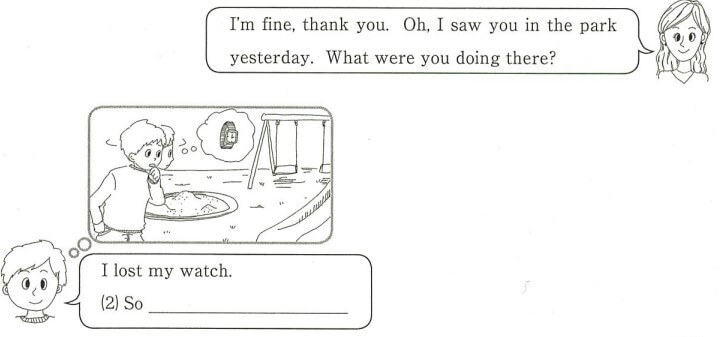

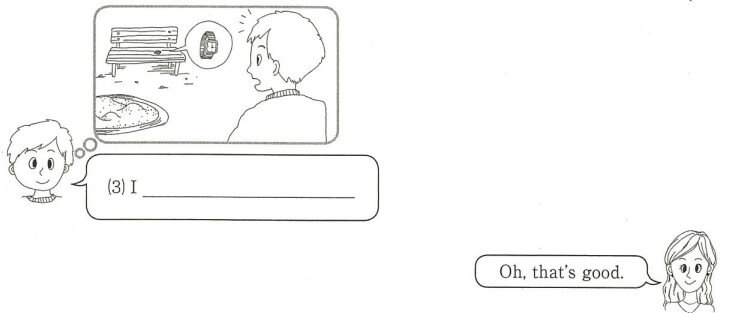
Ms. Green: Hi,Naoki.
Naoki: Hi, Ms. Green. (1) ________
Ms. Green: I’m fine, thank you. Oh, I saw you in the park yesterday. What were you doing there?
Naoki: I lost my watch. (2) So ________.
Ms. Green: Did you find it?
Naoki: Yes, I did.
Ms. Green: Where did you find it?
Naoki: (3) I ________.
Ms. Green: Oh, that’s good.
(1)(例)How are you?
(2)(例)I was looking for it.
(3)(例)found it on a bench.
(1)この言葉に I’m fine, thank you.「完気よ、ありがとう」と答えているので、How are you?「お気ですか?」のような相手の様子を尋ねる文にする。
(2)何をしていたかと尋ねられたのだから、していたことを答える。時計をなくしたと言っており、絵からは時計を捜している様子が読み取れるので、「私はそれを捜していた」という意味の文にする。問いかけが過去進行形(was/were+〜ing)なので、返答も過去進行形にする。また、直前の my watch は代名詞の it にするとよい。look for 〜「〜を捜す[探す]」
(3)どこでそれを見つけたかを尋ねられており、絵にはベンチの上でそれを見つけた様子が描かれているので、「私はそれをベンチの上で見つけた」という意味の文にする。「〜の上で」は on で表せる。find – found – found
次のクリスマスカードは、中学生の Sachiko が、オーストラリアにいる友人 Judy からもらったものです。また、後の英文は、Sachiko が送ったお礼のメールです。これを読んで、英文の意味が通るように、(ア)~(オ)に当てはまる単語を後の [ ] からそれぞれ 1 語選び、必要があれば適切な形に変えて書きなさい。
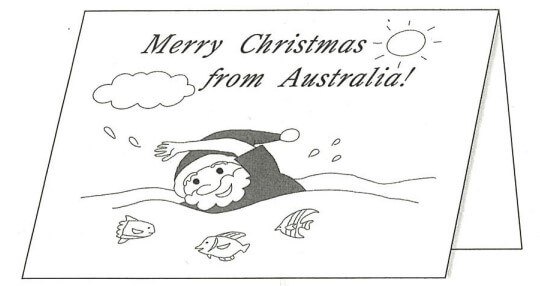
Hi Judy,
I’ve just (ア) your Christmas card. Thank you very much. I like the picture of *Santa Claus. He is(イ)with fish and looks so happy!
In the card, you say that you will go to the sea with your family on Christmas. That’s amazing! If I(ウ) in Australia, I could go to the sea with you.
Please tell me more about Christmas in summer. How does Santa Claus bring presents to children? Are there any popular Christmas songs (エ) by many people in Australia?
I’ll(オ) a New Year’s card to you soon.
Sachiko
(注) Santa Claus: サンタクロース
[ begin live receive send sing swim win ]
ア received イ swimming ウ lived エ sung オ send
<解説>
ア サチコはジュディからカードをもらったのだから、receive「〜を受け取る」を用いる。直前に I’ve Just とあるので、have/has+過去分詞の形の現在完了にする。
イ カードにはサンタクロースが魚と一緒に泳いでいる様子が描かれている。直前に isがあるので、swim「泳ぐ」を swimming とし,’am/are/is+〜ing”の現在進行形にする。
ウ 後ろにある could に注目して、”現在の事実に反する仮定を表す仮定法過去の文であることを読み取る。仮定法過去の形は”If+主語+動詞の過去形〜、主語+助動詞の過去形+動詞の原形・・。live – lived – lived
エ songs() by many peopleで「多くの人によって歌われる歌」という意味になると考えられる。「〜される」の意味を表すのは過去分詞。過去分詞sung で始まる語句が前の名詞 songs を修飾する過去分詞の形容詞的用法。sing-sang-sung
オ 「年賀状」を目的語にとる動詞として send「送る」を用いる。助動詞の willの後なので、原形の
まま使う。
次の英文は、中学生の Miho が英語の授業で行った発表 (presentation) と、その発表についてのクラスでのやり取りの一部です。英文を読んで、後の (1)~(3) の問いに答えなさい。
Ms. Noda: Hello, everyone. Today, you are going to *introduce places in Gunma to our new ALT, Mr. Smith. He has just come to Japan and wants to know where he should go in Gunma. Miho, please start your presentation.
Miho: Hello, Mr. Smith. We have heard that you like driving. So I’m going to talk about Michi-no-Eki in Gunma. Do you know what they are? Michi means “road” and Eki means “station” in English. They are places for people who travel by car. There are many things you can do at Michi-no-Eki. For example, you can buy many kinds of *locally produced food such as vegetables and fruits. I like cooking and eating very much, so it is fun to buy many kinds of food there. You can enjoy eating there, too. A lot of Michi-no-Eki have a restaurant in them. The restaurant uses locally produced vegetables for dishes and sweets. When I went to the Michi-no-Eki near my house last weekend, I had apple cake. It was so delicious. Also, you can see a nice *view if you go to Michi-no-Eki near the mountains. You can enjoy seeing beautiful mountains in each season. These are some of the things you can enjoy at Michi-no-Eki in Gunma. I hope you will go to them and have fun! Thank you for listening.
After Miho’s presentation, Mr. Smith and the students in the class are talking about it.
Mr. Smith: Thank you, Miho.
Miho: You’re welcome. [ A ]
Mr. Smith: It was very interesting. I have never been to Michi-no-Eki. But now I’m very interested in them because I like cooking, too. Yumi, have you ever been to Michi-no-Eki?
Yumi: Yes. I often go to the Michi-no-Eki near my grandmother’s house with my family because we can enjoy *hot springs there.
Mr. Smith: Really? That sounds nice.
Satoshi: Mr. Smith, there are more things we can do at Michi-no-Eki. Some Michi-no-Eki in Gunma have parks, and one Michi-no-Eki has a museum. We can enjoy playing outside or looking at pictures there.
Miho: That’s right. In fact, Gunma has the most Michi-no-Eki in the Kanto area. If you drive a car in Gunma, you will often see Michi-no-Eki. Please go to them.
Mr. Smith: [ B ] Miho, please tell me more about them later. I like driving very much, so going to Michi-no-Eki sounds really good to me
Miho: Sure!
(1) Miho は、発表の中で次の 4 枚の [スライド] を見せながら話をしました。発表の流れに合わせて使用するのに最も適切な順序となるように、次のア~エを並べなさい。
[スライド]
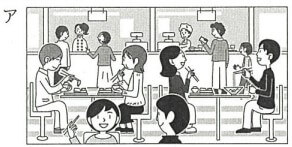
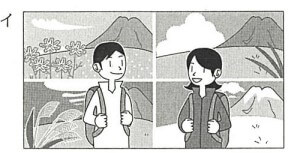
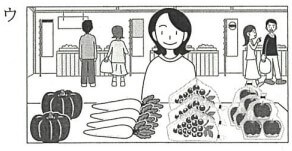
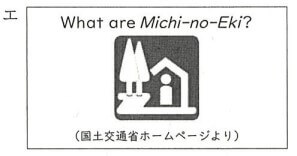
(2) [ A ]、 [ B ]に当てはまるものとして最も適切なものを、それぞれ次のア~エから選びなさい。
[ A ]
ア How about you?
イ How was my presentation?
ウ What was your favorite food?
エ Why do you think so?
[ B ]
ア I think you should go there.
イ I will never do that.
ウ Really? I don’t think so.
エ Thank you. I will.
(3) 本文の内容について、次の ①、② の問いに対する答えとして最も適切なものを、それぞれア~エから選びなさい
① Which is true about Mr. Smith?
ア He enjoys both cooking and driving.
イ He wants to climb the mountains in Gunma.
ウ He has been teaching at Miho’s school for many years.
エ He has been to one of the Michi-no-Eki which Miho likes.
② Which is true about things the students did for Mr. Smith in the English class?
ア Miho taught him how to make apple cake in the presentation.
イ Miho showed him things people can do and things they cannot do at Michi-no-Eki.
ウ Yumi asked him to go to Yumi’s grandmother’s house with his family.
エ Satoshi told him about parks and a museum at Michi-no-Eki in Gunma.
(1)エ→ウ→ア→イ
<要旨把握>第 2 段落のミホの説明に従って並べていく。まず、第 3〜6 文で道の駅とは何かを説明しているので、What are Michi-no-Eki?「道の駅とは何か」という話題を示すエを最初に置く。次に、第 8 文で、道の駅では地元の野菜や果物を買えると言っているので、ウを続ける。その後の第 1 文で、多くの道の駅にはレストランがついていると言っているので。く。第 15.16 文で、山に近い道の駅では四季折々の山の景色を
楽しめると言っているので、最後がイとなる。
(2)A イ B エ
A、この後のスミス先生の It Was very interesting:「大変興味深かった」という言葉が、ミホの発表に対する感想になっていることから、ミホは自分の発表の感想を尋ねたのだとわかる。
B. ミホに道の駅に行ってみるように勧められ、空所の後ではそれについてもっと教えてほしいと言っている。ここから、スミス先生がミホの提案を受け入れるような発言をしたのだとわかる。I will の後には、go to them が省略されている。
(3)①ア ②エ
①「スミス先生について正しいものはどれか」ニア。「彼は料理とドライプを両方とも楽しんでいる」第 6 段落第 3 文および第 11 段落第 3 文参照。
②「この英語の授業で生徒たちがスミス先生のためにしたことについて正しいものはどれか」エ、「サトシは先生に、群馬県内の道の駅にある公園と美術館について教えた」
第 9 段落参照。
次の英文を読んで、後の (1)~(3) の問いに答えなさい。
A junior high school student, Ken, learned about great *inventions in an English class. His English teacher, Mr. Hayashi, said, “Great inventions have changed our lives, but they have *caused some problems, too. For example, I think cars are great. Now, we can go to many places easily by car. But, because too many people use cars, we hear about some problems such as *accidents or more CO₂ in the air. In the next class, you are going to write about a great invention, so start thinking about it. *Take notes about your ideas.” Then Mr. Hayashi gave his students this *worksheet.
Invention: ________
Question 1: How has it changed our lives?
Question 2: What problems has it caused?
Ken decided to write about *smartphones because his mother was talking about her smartphone before. When he came home, he talked about smartphones with his mother. He said to her, “You said that your smartphone helped you a lot when you stayed in *Korea last month. How useful was it?” His mother said, “It was really useful. I don’t speak *Korean well, so my smartphone helped me in many ways. When I was hungry, I could find good restaurants very quickly, and my smartphone showed me how to get to them. Also, at the restaurants, I could choose and *order food easily. Because my smartphone has *machine translation, I could change Korean into Japanese and Japanese into Korean very quickly.”
She also said, “When I traveled to Korea for the first time in 2008, everything was different. I didn’t have a smartphone then, so I bought a map and some books for tourists before the trip. Sometimes it was very difficult to find how to get to restaurants on the map. And I couldn’t choose food easily because I couldn’t read Korean. When I didn’t know how to get to restaurants or order food, I had to ask people. That was also difficult.” Ken said, “I see. So smartphones have changed how people travel.” His mother said, “Yes, I really think so.”
After Ken talked with his mother, he thought about problems which smartphones caused. He remembered that a doctor talked about some problems on the news. For example, our eyes get bad if we look at our smartphones too much. Also, we should not use them for a long time before we go to bed because we cannot sleep well. He also thought, “Some people use their smartphones while they are walking or driving. There are many accidents because of this.”
Ken took notes about his ideas on the worksheet. He thought, “I will write about these ideas in the next class. Smartphones are useful, but people who use them should know about their problems, too.”
(1)次の①、②の問いに対して、本文の内容に合うように、それぞれ4語以上の英語で答えなさい
① What invention did Mr. Hayashi talk about as an example in the English class?
② When did Ken’s mother go to Korea for the first time?
(2)本文の内容と合っているものを、次のア~エから1選びなさい。
ア Ken chose to write about smartphones because he often used his smartphone when he stayed in Korea.
イ It wasn’t easy for Ken’s mother to change one language into another language with machine translation.
ウ Ken’s mother told him about some problems of smartphones, and Ken decided to write about them.
エ Ken has realized that there are both good points and bad points of smartphones that people need to know.
(3)Kenは、worksheetにメモを取った内容をもとに、次の【作文】を書きました。【作文】中の[ A ]、 [ B ]に当てはまるものとして最も適切なものを、後のア~ウからそれぞれ選びなさい。
また、[ C ]、[ D ]には、本文から連続する4語をそれぞれ抜き出して答え、【作文】を完成させなさい。
【作文】
People have invented many great things. I think smartphones are one of them.
Smartphones have changed how people travel. When my mother went to Korea for the first time, [ A ].
But this year, her trip to Korea was easier because [ B ].
However, smartphones have caused some problems, too. If we use smartphones too much,[ C ] and [ D ].
• Also, there are accidents because some people walk
and use smartphones at the same time. We should be careful about these problems if we use smartphones.
A
ア she could find restaurants very quickly
イ she took a map and some books for tourists with her
ウ she didn’t have to ask people how to order food
B
ア her smartphone showed her when to order food
イ she spoke Korean well and asked people many things
ウ her smartphone helped her do things she wanted
(1) ①(例)He talked about cars. ②She went there in 2008.
①「ハヤシ先生は英語の授業で例として何の発明品について話したか」「彼は自動車について話した」第 1 段落第 3〜5 文参照。
②「ケンの母が初めて韓国に行ったのはいつか」「彼女は 2008 年にそこへ行った」第 3段落第 1 文参照。
(2)エ
エ.「ケンは、スマートフォンには人々が知る必要のある⻑所と短所の両方があるとい
うことに気づいた」…最終段落最終文に一致する。
(3)A イ B ウ C our eyes get bad D we cannot sleep well
<全訳>「人々はたくさんのすばらしい物を発明してきた。スマートフォンはそのうちの1 つだと思う。スマートフォンは人々の旅行の仕方を変化させてきた。僕の母が初めて韓国に行ったとき。A 彼女は地図と、観光容向けの本を何冊か持っていった。しかし今年、彼女の韓国への旅行はもっと楽になった、というのも、B 彼女がしたいことをするのにスマートフォンが役立ったからだ。/しかし、スマートフォンにはいくつかの問題点もある。スマートフォンを使いすぎると、c 目が悪くなるし。よく眠れなくなる。また、歩きながら同時にスマートフォンを使う人がいるため、事故が起きている。スマートフォンを使うのなら、こうした問題に注意するべきだ」
<解説>A.第 3 段落第 1,2 文参照。B.第 2 段落後半参照。
C•D. 第 4 段落第 3,4 文参照。
英語の授業で、国連が定める様々な記念日について調べ、ポスターにまとめて発表する活動を行いました。
次の【ポスター】は、RioのグループがWorld Water Day(世界水の日)について調べたごとをたものです。後の《条件》に従って、[ (A) ]~[ (C) ]に入る内容を英語で書きなさい。
【ポスター】
March 22 is World Water Day!
People cannot live without water. It is important for everyone in the world to get clean and safe water easily.
We need to realize:
1. Clean and safe water is necessary for our health.
We need clean and safe water for [ (A) ], [ (B) ],and so on.
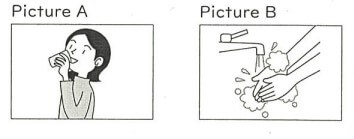
2. Getting water easily is also important for children’s *education.
In Japan, we [ (C) ]
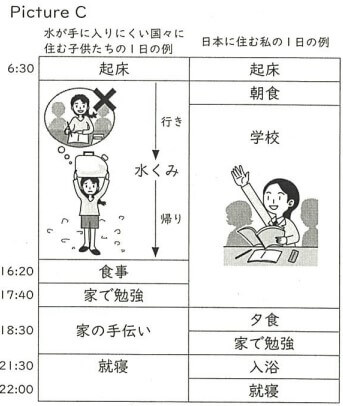
《条件》
・[ (A) ]には1語、 [ (B) ]には3話で、それぞれPicture A,Bに合う英語をくこと。
・[ (C) ]には、下線部の内容について、Picture Cの「水が手に入りにくい国々に住む子供たちの1日の例」と「日本に住む私の1日の例」を比較して分かることを、書き出しに焼けて30語~40語の英語で書くこと。ただし、英文の数はいくつでもよい。
・符号(, .!? ” など)は話数に含めないこと。
・解答の仕方は、[記入例]に従うこと。
[記入例]
Is
it
raining
now?
No,
it
isn’t.
(A) drinking
<適語補充>絵 A は水を飲んでいる様子を表しているので、drink「飲む」を用いる。for のような前置詞の後に動詞を置くときは、〜ing(動名詞)にする。
(B) washing our hands
<適語句補充>絵 B は手を洗っている様子を表しているので、「(自分たちの)手を洗う」といった内容にする。(A)とともに前置詞の for の後に続く形になっているので、動名詞にして washing our hands とする。
(C)(例) could be something like “have easy access to water,” referring to how access to water is part of daily life for Japanese students.
<条件作文>水の手に入りやすさと教育との関係について、絵 C の 2 つの例を比較して述べる。絵 C によると、水が手に入りにくい国では、子どもたちは水をくむのに⻑い時間をとられ、学校で勉強することができない。一方、日本にいる「私」は、学校で⻑時間勉強することができている。これは、水が簡単に手に入り、水をくみに行く必要がないからである。以上の内容を、日本の場合と水が手に入りにくい国の場合に分け、日本の場合から先に説明すればよい。
家庭教師のやる気アシストは、群馬県にお住まいの受験生のお子さんを毎年たくさん指導をさせ頂き、合格に導いています。
高い合格率の秘訣は、指導経験豊富な先生の指導力に加え、1対1の指導でお子さん一人ひとりの状況に合わせた、お子さんだけのカリキュラムで勉強が進められるから!
家庭教師のやる気アシストは、お子さんの志望校合格まで全力でサポートさせて頂きます!
お子さんにとって「成果が出る勉強法」ってどんな勉強法だと思いますか?
お子さんそれぞれに、個性や性格、学力の差もあります。そんな十人十色のお子さん全員に合う勉強法ってなかなかないんです。
たからこそ、受験生の今だけでもお子さんだけの勉強法で受験を乗り越えてみませんか?
やる気アシストには、決まったカリキュラムはありません。お子さんの希望や学力、得意や不得意に合わせて、お子さんだけのカリキュラムで指導を行っていきます。また、勉強法もお子さんそれぞれに合う合わないがあります。無料体験授業では、お子さんの性格や生活スタイルを見せていただき、お子さんにとって効率的な成果の出る勉強のやり方をご提案させて頂きます。

